Overview
A brand name represents more than just a label; it embodies a company’s identity, values, and the emotional connections it forges with consumers. In today’s competitive market, this is crucial for standing out. Many founders may feel overwhelmed by the challenge of creating a memorable brand that truly reflects their mission. This struggle can lead to frustration, especially when research shows that a strong brand identity is key to enhancing customer loyalty and influencing purchasing decisions.
But there is hope. By focusing on crafting a brand name that resonates with your audience, you can foster those essential connections. Remember, effective brand names are not only memorable but also mirror the heart of your company. Embracing this journey can significantly impact your business's success, nurturing both your brand and your relationship with customers.
Introduction
In the ever-evolving world of modern marketing, many startup founders struggle to grasp the importance of a brand name. As businesses compete for consumer attention in a crowded marketplace, the challenge of standing out can feel overwhelming. A thoughtfully crafted brand name is not just a label; it’s a vital differentiator that captures the essence of your product or service and builds emotional connections with your audience.
Research shows that a staggering 77% of purchasing decisions are influenced by brand recognition, highlighting the critical nature of establishing a memorable identity. This can be daunting, but it’s essential to remember that you are not alone in this journey. From choosing names that evoke the right feelings to navigating the legalities that safeguard your brand’s integrity, understanding the complexities of brand naming is crucial for success in 2025 and beyond.
In this article, we will explore the various dimensions of brand names, share insights into the creative processes behind their development, and address the challenges that brands face in an ever-changing market. Together, we can navigate this landscape and ensure your brand resonates with those who matter most.
Understanding the Concept of a Brand Name
In today’s crowded marketplace, a significant challenge arises: how do consumers identify and differentiate products? This is where trademarks come into play. A trademark serves as a distinctive label, essential for understanding what a brand truly represents. It allows buyers to navigate an overwhelming array of options, ensuring they can find what resonates with them. A thoughtfully chosen label encapsulates the essence of the product, conveys its value, and fosters emotional connections with consumers.
Consider iconic brands like 'Apple' and 'Nike.' These names evoke specific images and associations, functioning as powerful marketing tools that resonate deeply with their audiences. They remind us that labels are more than just names; they are the heart of a brand’s identity.
As we look ahead to 2025, we must recognize the profound significance of these labels. Research indicates that 77% of shoppers make purchasing decisions based on brand awareness, underscoring how crucial a strong identity is in shaping buyer behavior. Furthermore, impactful product titles can significantly enhance customer loyalty. When companies align their products with their core values and the aspirations of their audience, they create a deeper emotional connection that often leads to favorable word-of-mouth referrals.
Take Patagonia, for example. Their commitment to environmental sustainability and ethical practices resonates with individuals who prioritize these values, illustrating the power of aligning brand identity with consumer beliefs.
Case studies further illuminate the success that comes from strategic product identification. RNO1’s partnerships with clients like the EOS Network Foundation and Interos showcase how branding can cultivate emotional ties by aligning values with aspirations. Companies that have effectively developed labels connecting with their target demographics report a remarkable 30% increase in customer engagement.
This emotional bond not only fosters loyalty but also encourages repeat purchases, highlighting the significant impact a thoughtfully designed label can have on buying decisions.
Experts in branding emphasize that a brand name should be memorable, easy to pronounce, and reflective of the company’s identity. Dayne Lee aptly notes, 'Market research is vital in marketing,' reminding us of the importance of understanding consumer perceptions when crafting a product title. RNO1, recognized as a leader in branding and digital design, offers innovative services such as Brand Refresh and Brand Identity. These services are vital for companies looking to invest in deliberate title development as part of their marketing strategy.
Moreover, RNO1’s collaborations with industry giants like Microsoft and Airbnb have further refined , enhancing their market effectiveness. In conclusion, as we move into 2025, the influence of brand labels on purchasing choices cannot be overstated. It is essential for brands to prioritize effective label development, nurturing the emotional connections that drive consumer loyalty.
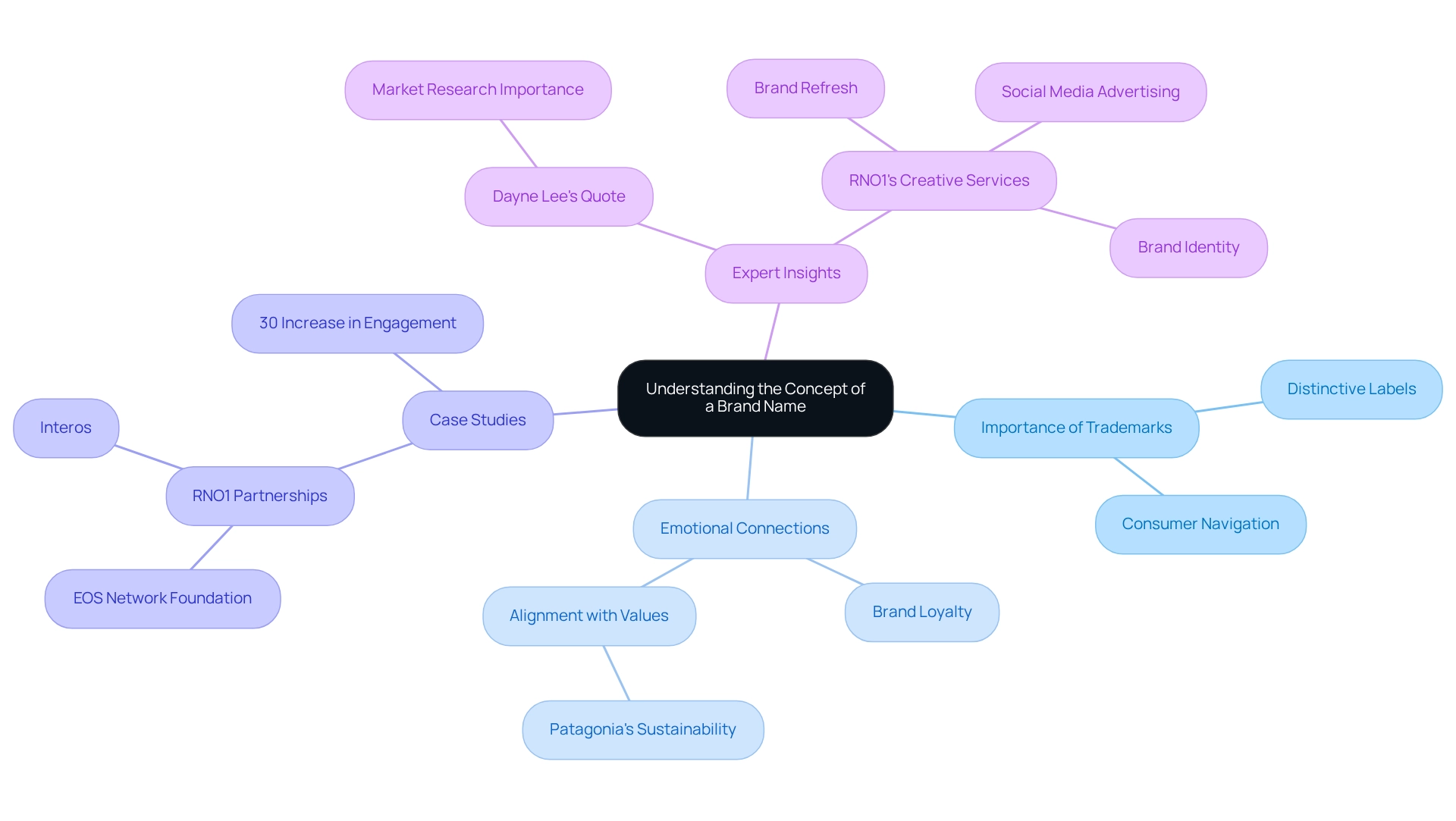
Exploring Different Types of Brand Names
Brand labels present a significant challenge for many businesses, as they can be categorized into several distinct classes, each serving unique strategic purposes and influencing consumer perceptions in various ways. These categories encompass descriptive, suggestive, arbitrary, and invented terms.
Descriptive titles, such as 'General Motors,' directly convey the nature of the business. They are clear and informative, making it easy for individuals to grasp what the brand provides at a glance. This clarity often leads to a larger market share, as seen with Aerie approaching a $1 billion valuation, showcasing can drive market success.
On the other hand, suggestive names like 'Netflix' imply a benefit or experience, evoking emotions that resonate with consumers. This kind of title can establish a strong connection with the company's value proposition, enhancing its allure. Megan Brophy, Vice President of Marketing at Abercrombie & Fitch, observes that 'advertising for Gen Z can be messy and chaotic,' highlighting the challenges companies face in engaging with this demographic through suggestive naming.
Then we have arbitrary names, such as 'Apple,' which bear no inherent connection to the product itself. Yet, through effective branding efforts, these titles can become synonymous with the entity's identity, creating a memorable and distinctive presence in the industry.
Lastly, coined names like 'Kodak' fall into this category. These invented words can promote distinct identities, allowing firms to create a strong presence in the industry without the limitations of established language.
Recent research indicates that the effectiveness of these labeled types varies significantly. For example, descriptive titles often capture a larger share of the audience due to their clarity, while suggestive terms can drive higher engagement through emotional connections. A case study on Gen Z's purchasing journey reveals that this demographic heavily relies on social media for product discovery, favoring companies with appealing titles that resonate with their values and experiences.
It's heartening to note that they still engage in in-store purchases, indicating a blend of online and offline shopping behaviors.
As we look toward 2025, the landscape of product labeling continues to evolve. Companies are increasingly acknowledging the importance of aligning their identifiers with consumer expectations and market trends. Understanding the subtleties of descriptive versus suggestive labels is essential for contemporary marketers striving to develop influential identities, as it relates to the definition of a brand name. Moreover, techniques to establish harmony among conflicting concepts can enhance marketing strategy, ensuring that products connect effectively with their target audiences. This journey is not just about labels; it's about fostering connections and understanding the emotional landscape of consumers.
The Importance of Choosing the Right Brand Name
Choosing a suitable label is vital for a company's success in today's competitive market, especially for tech startups that often grapple with understanding the essence of a brand name to forge a strong identity. A powerful label should not only be memorable and easy to pronounce but also resonate with the product or service it represents. Research indicates that around 65% of buyers find a favorable interaction with a label to be more impactful than striking advertising. This highlights the importance of a term that evokes positive feelings.
Such titles can significantly enhance loyalty to a product and encourage word-of-mouth promotion. Moreover, serves as a strong differentiator in a crowded market, making it easier for buyers to recall and recommend. For instance, companies that utilize alliteration, like Dunkin’ Donuts and PayPal, have been shown to improve memory recall by 37%, thereby increasing their memorability and nurturing customer loyalty.
This technique of repeating consonant sounds generates appealing and unforgettable titles, which can be particularly advantageous for both startups and established companies.
As of November 17, 2025, the influence of product titles on buyer choices remains profound. Expert insights consistently underscore that a powerful label can greatly affect buyer behavior, shaping perceptions and motivating purchasing decisions. As Leigh Ann Tucker noted, RNO1's ability to transform branding strategies and enhance digital marketing effectiveness through the rebranding of Founder's Haven is a testament to the strength of a carefully selected title.
This strategic rebranding not only empowers modern founders but also illustrates how innovative branding can lead to digital success. RNO1 employed techniques such as market research, consumer feedback analysis, and targeted messaging to ensure that the rebranding resonated with the needs and aspirations of contemporary founders.
Furthermore, it is essential to avoid generic or hard-to-pronounce titles, as these can hinder recognition and longevity. Historically, names like Stella Artois, which boasts the world's oldest logo still in use since 1366, demonstrate the lasting impact a strong identity can create. Ultimately, selecting a label that embodies the definition of a brand name and aligns with the values and emotions of the target audience is crucial for fostering long-term loyalty and recognition in the marketplace.
The right label not only captures attention but also nurtures a lasting bond with buyers, paving the way for ongoing success.
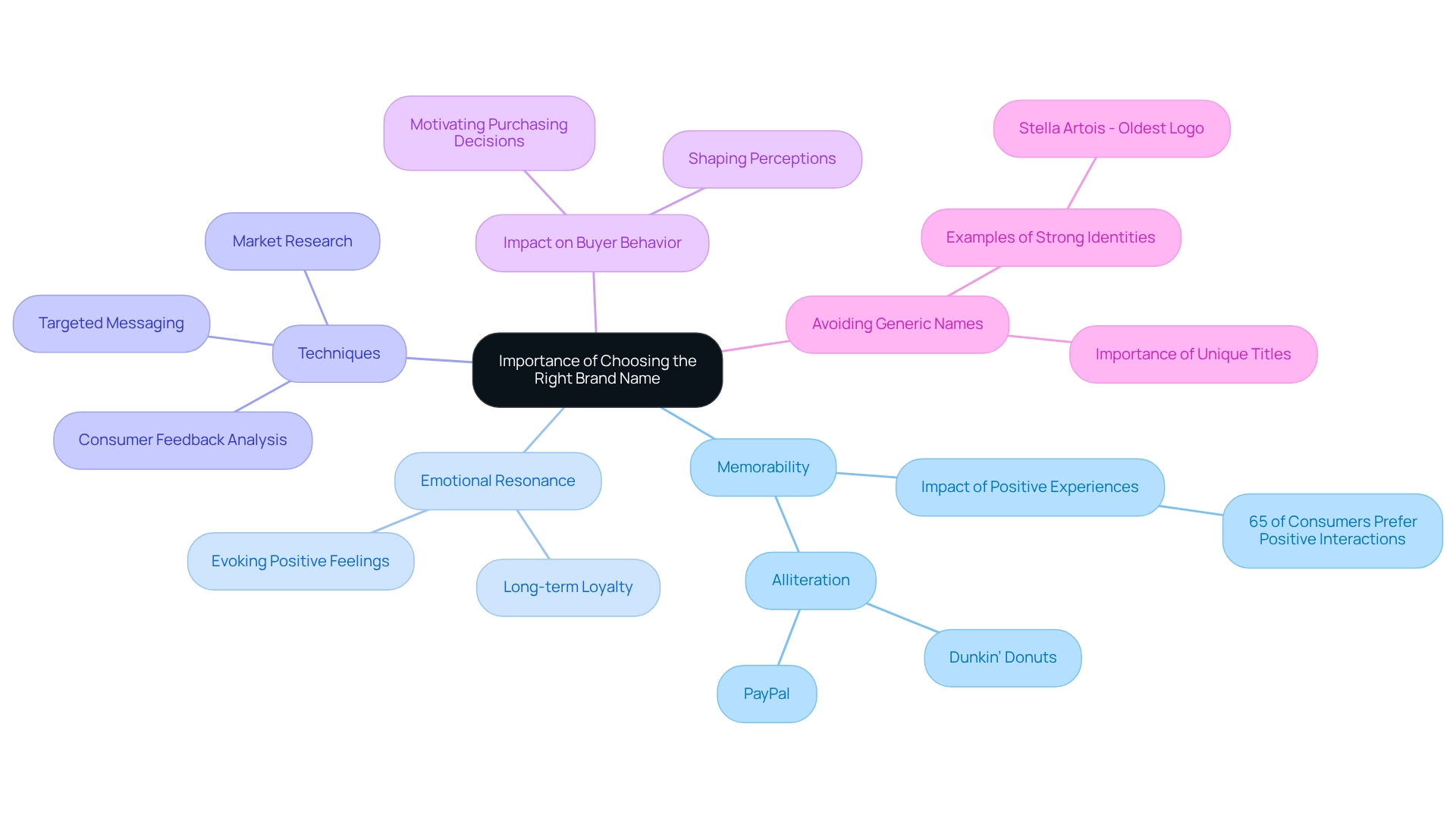
Legal Considerations: Trademarking Your Brand Name
Trademarking a label is an essential step for startups striving to protect their intellectual property and establish a strong market presence. Without a trademark, startups may face the daunting challenge of others using similar terms, potentially leading to consumer confusion. This legal protection not only enhances product recognition but also nurtures customer loyalty over time, as a well-established trademark makes the product more memorable.
begins with a thorough search to ensure that the desired name is not already in use. This initial step can feel overwhelming, but it’s crucial for laying a solid foundation. After this, an application must be filed with the appropriate trademark office. Companies like Coca-Cola and Google serve as inspiring examples of how effective trademarking can fortify product identities and deter unauthorized use.
Statistics show that registered trademarks significantly ease business expansion into new markets, underscoring their importance for startups eager to grow. A study on employer reputation reveals that 69% of job candidates are likely to reject offers from companies with poor images. This statistic highlights the vital role a strong trademark plays in shaping public perception. As Ben Franklin wisely noted, "It takes many good deeds to build a reputation, and only one bad one to lose it," reminding us of the importance of trademarking in establishing and maintaining a company’s reputation.
Expert advice encourages startups to prioritize trademarking as a key part of their branding strategy. Intellectual property attorneys emphasize that safeguarding trademarks is essential for preserving a competitive advantage in the marketplace. As the landscape evolves, staying informed about trademarking news and trends becomes crucial for ensuring ongoing protection of identity.
In 2025, the significance of trademarking continues to resonate, with many companies adeptly managing the trademarking process to strengthen their identity. By understanding the profound impact of trademarking on identity and presence, startups can better position themselves for success in an increasingly competitive environment. RNO1’s dedication to radical digital experiences and successful collaborations further illustrates how effective branding strategies can be developed, offering valuable insights for tech startup founders. Together, we can navigate this journey and build a strong foundation for your brand.
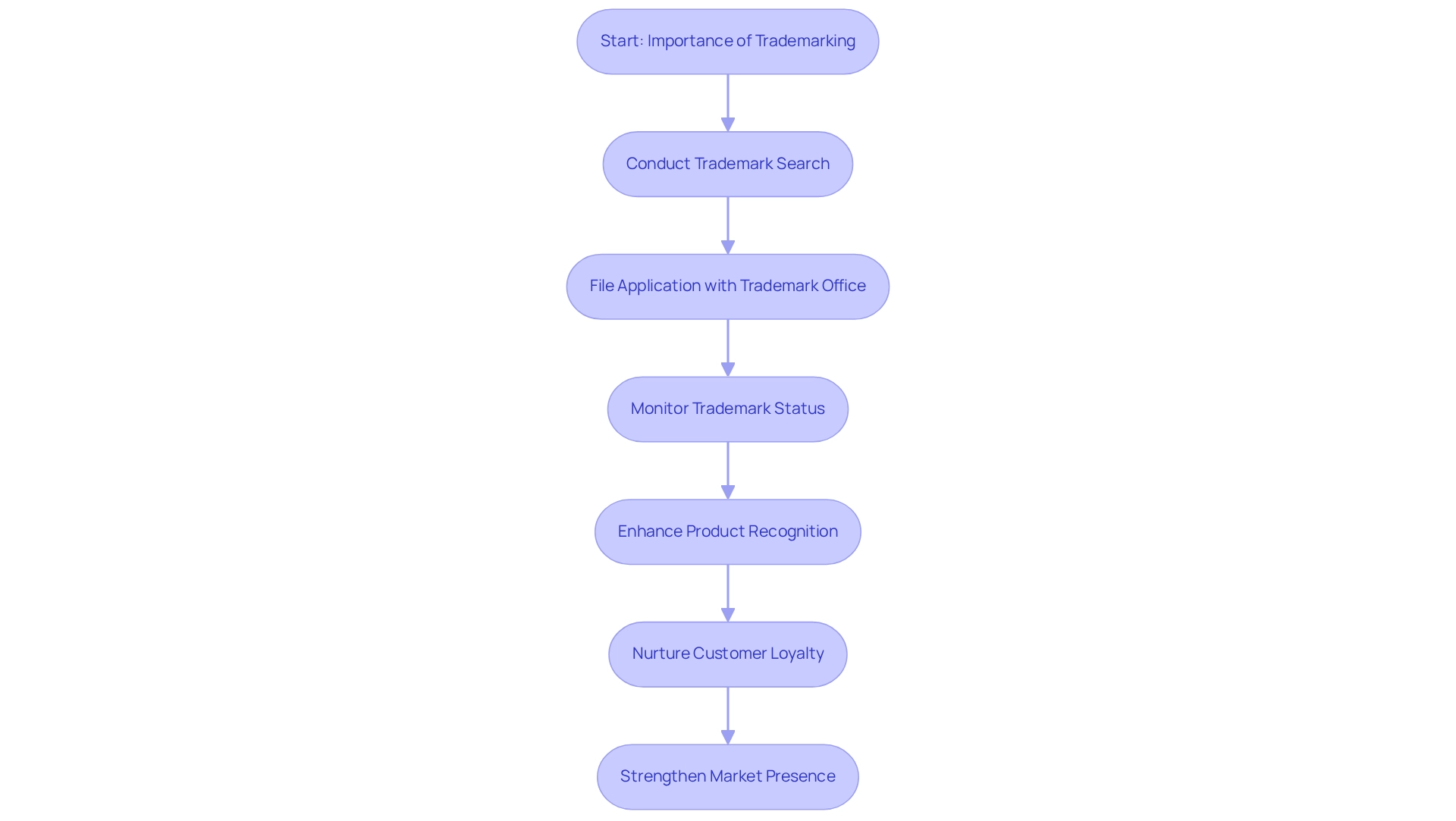
Common Challenges in Naming a Brand
Naming a product can be a daunting task, filled with challenges that many founders face. Legal barriers, cultural sensitivities, and the need for market relevance can weigh heavily on your mind. One common pitfall is selecting a name that closely resembles established companies, which can lead to legal disputes and cause confusion among consumers. Moreover, if the name doesn’t resonate with your target audience or capture the essence of your company, it can hinder your marketing efforts, leaving you feeling frustrated and uncertain.
Startups often struggle to strike a balance between innovation and clarity. This balancing act is crucial, as it can define your brand's identity in a competitive landscape. To navigate this, it’s essential to engage in thorough research and testing before finalizing a name. By doing so, you can alleviate some of the pressure and ensure that your chosen title not only stands out but also connects meaningfully with your audience.
Remember, you’re not alone in this journey. Many founders have walked this path and found success by prioritizing thoughtful naming strategies. Embrace the process, seek feedback, and remain open to adjustments. With the right approach, you can create a name that truly reflects your vision and resonates with those you aim to serve.

The Creative Process of Developing a Brand Name
Creating a product name can feel daunting, often leaving founders overwhelmed by the myriad of choices. It’s a common struggle, one that can evoke feelings of uncertainty and pressure. But you don’t have to navigate this alone. At RNO1, we understand the emotional weight of this task, and we’re here to help you through it.
The journey begins by gathering a diverse team, fostering an environment where a wide array of ideas can flourish. Together, you can focus on keywords that truly reflect your organization’s values and mission. Techniques like mind mapping and word association can spark creativity and bring forth innovative concepts.
Our commitment to a design-driven approach ensures that every step we take is infused with the power of design. This not only reflects our values but also enhances your product's marketability through our Return On (RODD) strategies. Once you have a shortlist of potential names, it’s crucial to conduct research to gauge consumer reactions and preferences.
Engaging with your intended audience can provide invaluable insights, allowing you to refine your choices further. This process ensures that the name you select resonates deeply within your industry, creating meaningful connections. Remember, at RNO1, we’re dedicated to supporting you every step of the way, ensuring that your product name embodies not just a label, but a true reflection of your vision.
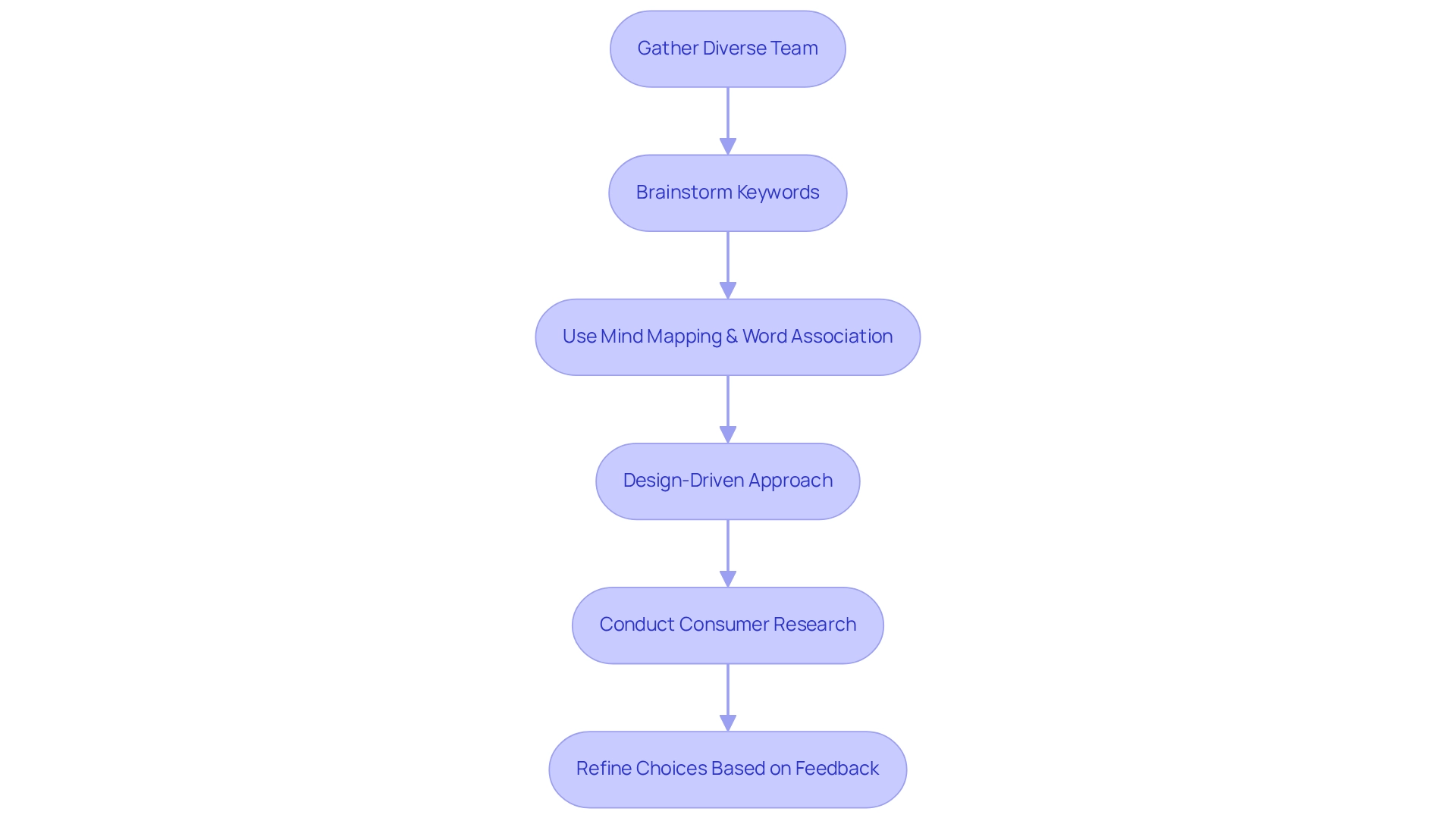
Adapting Brand Names in a Changing Market
In today's fast-paced market, many companies face the challenge of needing to modify their identities and strategies to stay relevant. This can be a daunting task, as it often involves rebranding efforts to reflect changes in consumer preferences, technological advancements, or shifts in the competitive landscape. For example, RNO1's strategic rebranding of Founder's Haven serves as a beacon of hope, aiming to empower modern founders for digital success.
Similarly, companies like Dunkin' have made the thoughtful decision to streamline their name from 'Dunkin' Donuts' to simply 'Dunkin''. This change highlights their focus on beverages and represents a refreshing update to their image. Furthermore, RNO1's Ryde initiative showcases innovative strategies for scaling , enhancing e-commerce engagement through . This initiative is not just about numbers; it features focused partnerships, community involvement strategies, and tangible results such as enhanced visibility and increased sales conversions.
It is vital for companies to consistently evaluate their alignment with market trends and client expectations to preserve a strong identity. RNO1's expertise in performance marketing, which encompasses data-driven strategies and analytics, plays a crucial role in this ongoing journey. By nurturing these relationships and staying attuned to the needs of the market, RNO1 stands ready to support tech startup founders in navigating these challenges with compassion and care.
Key Takeaways on Brand Names
A trademark holds immense importance as it defines a brand name, forming the bedrock of a firm's identity and marketing strategy. It plays a vital role in shaping how customers perceive and engage with a label. A trademark must be unique and memorable, effectively embodying the company's core values and mission. In 2025, the importance of brand identity is underscored by the fact that around 65% of buyers find a positive experience with a company more impactful than striking advertising. This highlights the need for a brand name that resonates with intended audiences.
Effective product naming techniques often involve an organized creative process that includes:
- Brainstorming
- Market analysis
- User feedback
This approach not only aids in crafting a name that stands out but also ensures it aligns with buyer values. Take, for instance, RNO1's strategic rebranding of Founder's Haven, showcased on November 17. This example illustrates how aligning identities with customer values can foster meaningful connections and enhance client loyalty by being authentic and engaging with their audience.
This case study emphasizes the importance of weaving core values into branding, which is essential for modern companies striving to connect with their audience.
Insights from branding specialists reveal that the definition of a brand name can significantly shape business strategy. Statistics show that 46% of buyers are willing to pay more for brands they trust, reinforcing the idea that a brand name is a thoughtfully chosen title that can boost brand loyalty and perceived value. Moreover, distinctiveness and memorability are crucial; a title that captures attention offers a clear definition of a brand name, leading to greater recognition and customer loyalty.
As Monique observes, "Artificial Intelligence (AI) plays a significant role in personalizing customer experience, predicting consumer behavior, automating customer interactions, and providing insights for strategic decision-making in branding." This highlights the relevance of contemporary branding strategies. RNO1 harnesses AI to refine , ensuring they are data-driven and centered around the consumer.
Successful brands like Apple and Nike serve as prime examples of the strategic value in creating a lasting impression, which contributes to the definition of a brand name and the establishment of a strong market presence. These brands have effectively utilized their identities to convey innovation and athleticism, respectively, demonstrating how a well-defined brand name can drive business success through a deliberate naming approach. RNO1's emphasis on radical digital experiences positions it as a leader in branding and digital design, showcasing how innovative branding strategies are vital for modern companies.
In conclusion, understanding the various types of trademarks, the importance of legal protections, and the challenges inherent in branding empowers companies to make informed decisions. The ability to adapt to evolving market conditions while maintaining a clear brand identity is essential for crafting a successful brand name that resonates with consumers and stands the test of time.
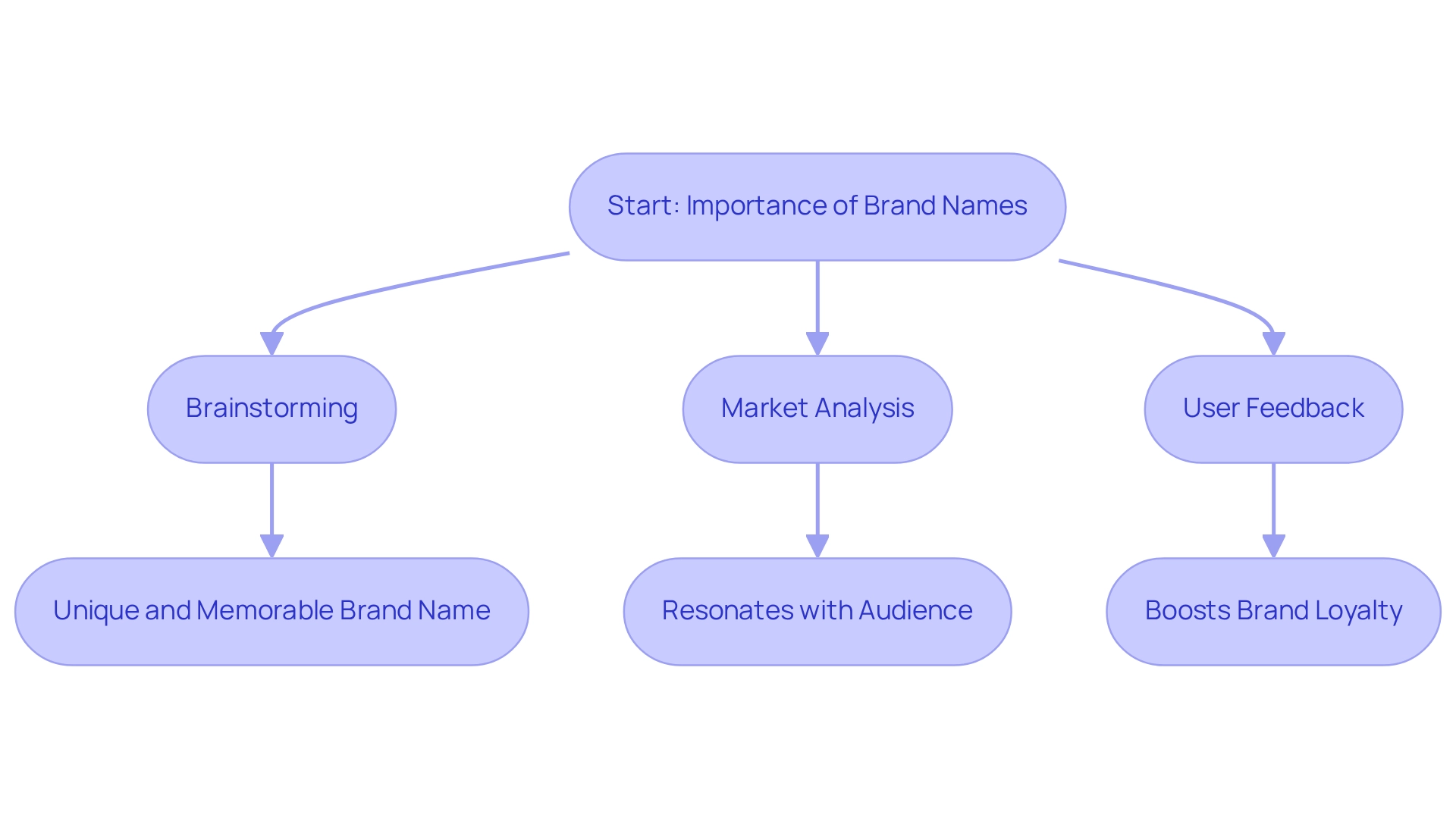
Conclusion
A brand name represents more than just a label; it serves as the cornerstone of a company's identity and significantly influences consumer engagement. Many startup founders grapple with the challenge of establishing a memorable brand. This article has highlighted the critical role of a well-crafted brand name, illustrating how it shapes consumer perceptions, purchasing decisions, and long-term loyalty. From the variety of brand names—descriptive, suggestive, arbitrary, and coined—to the essential legal considerations of trademarking, each element is vital in defining a brand's market presence.
The necessity of selecting a name that resonates with target audiences is paramount. A strong brand name not only boosts recall and recognition but also nurtures emotional connections that can lead to brand advocacy. As we've seen, brands that align their names with their core values and consumer aspirations are more likely to flourish in an increasingly competitive landscape. The case studies and expert insights shared throughout this piece illustrate that a strategic approach to brand naming, grounded in market research and consumer feedback, is crucial for success.
As we look ahead to the rapidly evolving marketplace of 2025, it’s essential for companies to remain adaptable, rebranding when necessary to stay relevant while safeguarding the essence of their identity. Navigating the complexities of brand naming—from creativity to legal protections—is vital for both startups and established businesses. Ultimately, a thoughtfully chosen brand name lays the groundwork for enduring success, ensuring that brands not only capture attention but also cultivate meaningful relationships with consumers over time. Remember, you’re not alone in this journey; together, we can navigate the path to a powerful brand identity.
Frequently Asked Questions
What role do trademarks play in consumer decision-making?
Trademarks serve as distinctive labels that help consumers identify and differentiate products, allowing them to navigate a crowded marketplace and find brands that resonate with them.
How do brand names influence consumer perceptions?
Brand names encapsulate the essence of a product, convey its value, and foster emotional connections with consumers, making them a crucial aspect of a brand's identity.
Why are brand labels significant for businesses?
Strong brand labels are essential for shaping buyer behavior, as research indicates that 77% of shoppers make purchasing decisions based on brand awareness, which can enhance customer loyalty.
Can you provide examples of brands that effectively use their labels?
Iconic brands like Apple and Nike evoke specific images and associations, functioning as powerful marketing tools that resonate deeply with their audiences.
How does aligning brand identity with consumer values affect loyalty?
When companies align their products with their core values and the aspirations of their audience, they create emotional connections that often lead to increased customer loyalty and favorable word-of-mouth referrals.
What are the different categories of brand labels?
Brand labels can be categorized into descriptive, suggestive, arbitrary, and invented terms, each serving unique strategic purposes and influencing consumer perceptions in different ways.
What is an example of a descriptive brand name?
An example of a descriptive brand name is General Motors, which clearly conveys the nature of the business.
How do suggestive names differ from descriptive names?
Suggestive names, like Netflix, imply a benefit or experience and evoke emotions that resonate with consumers, whereas descriptive names provide clear and informative insights into the business.
What is the significance of arbitrary and coined names?
Arbitrary names, such as Apple, have no inherent connection to the product but can become synonymous with the brand's identity through effective branding. Coined names, like Kodak, promote distinct identities without the limitations of established language.
How do generational preferences impact brand naming?
Recent research indicates that Gen Z heavily relies on social media for product discovery and favors companies with appealing titles that resonate with their values and experiences, indicating a blend of online and offline shopping behaviors.




